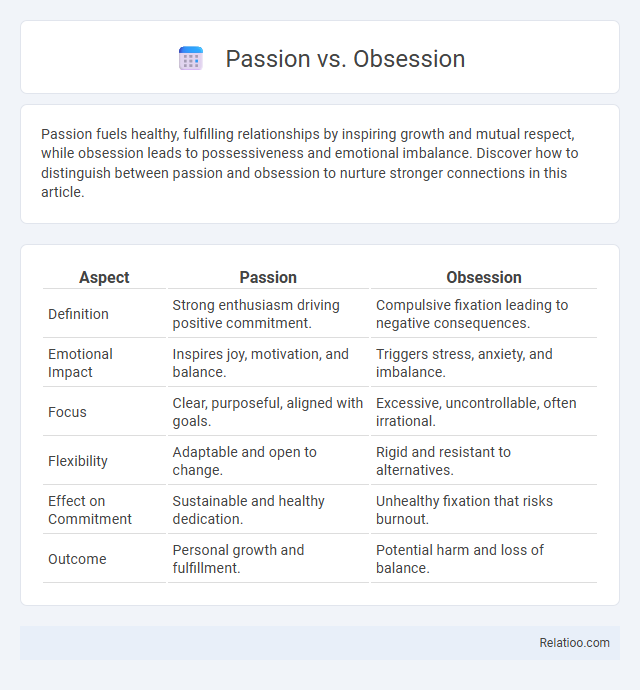Passion fuels healthy, fulfilling relationships by inspiring growth and mutual respect, while obsession leads to possessiveness and emotional imbalance. Discover how to distinguish between passion and obsession to nurture stronger connections in this article.
Table of Comparison
| Aspect | Passion | Obsession |
|---|---|---|
| Definition | Strong enthusiasm driving positive commitment. | Compulsive fixation leading to negative consequences. |
| Emotional Impact | Inspires joy, motivation, and balance. | Triggers stress, anxiety, and imbalance. |
| Focus | Clear, purposeful, aligned with goals. | Excessive, uncontrollable, often irrational. |
| Flexibility | Adaptable and open to change. | Rigid and resistant to alternatives. |
| Effect on Commitment | Sustainable and healthy dedication. | Unhealthy fixation that risks burnout. |
| Outcome | Personal growth and fulfillment. | Potential harm and loss of balance. |
Understanding Passion and Obsession: Core Differences
Passion ignites motivation and joy, driving sustained effort toward meaningful goals, whereas obsession often leads to compulsive behavior and emotional distress, overshadowing balance and well-being. Understanding the core difference lies in recognizing passion as a healthy, inspiring engagement that fosters growth, while obsession denotes an overwhelming fixation that can impair judgment and relationships. Identifying these distinctions enhances self-awareness and supports cultivating passionate pursuits without crossing into harmful obsession.
The Psychology Behind Passion and Obsession
Understanding the psychology behind passion and obsession reveals critical differences in motivation and emotional impact. Passion drives your purposeful engagement and positive energy towards goals, fostering creativity and well-being, while obsession often triggers anxiety and compulsive behaviors that can undermine mental health. Exploring these psychological dynamics helps you recognize behavioral patterns, enabling healthier management of your desires and ambitions.
Signs You’re Passionate, Not Obsessed
Passion fuels your motivation with a sustained and balanced energy, while obsession consumes your thoughts and disrupts daily life. Signs you're passionate include feeling inspired without sacrificing personal well-being, maintaining control over your actions, and enjoying the process rather than fixating on outcomes. Your passion enhances growth and fulfillment, whereas obsession often leads to stress and burnout.
When Passion Turns Into Obsession: Warning Signals
Your enthusiasm for a hobby or career can fuel motivation and creativity, but when passion turns into obsession, it often leads to unhealthy behaviors such as neglecting personal relationships, consistent stress, and an inability to set boundaries. Warning signals include compulsive thoughts, sacrificing sleep or health, and feeling anxious or upset when unable to engage in the obsession. Recognizing these signs early allows you to maintain a balanced and fulfilling life without letting passion become detrimental.
Impact on Mental and Emotional Well-being
Passion fuels motivation and enhances mental well-being by providing a sense of purpose and fulfillment, while obsession often leads to stress, anxiety, and emotional imbalance due to its compulsive nature. Your mental clarity and emotional health improve when passion drives your goals, as it encourages healthy boundaries and sustainable enthusiasm. Obsession blurs these boundaries, potentially resulting in burnout and decreased overall happiness.
Healthy Motivation: Harnessing Passion Without Crossing the Line
Healthy motivation stems from passion, which fuels creativity and sustained effort without causing burnout. Obsession, by contrast, involves a compulsive drive that often leads to neglect of well-being and relationships. Balancing enthusiasm with self-awareness allows passion to inspire growth while avoiding the detrimental effects of obsession.
Obsession’s Downside: Risks to Relationships and Success
Obsession can undermine your relationships by causing emotional strain, neglect, and communication breakdowns, as it often leads to an unhealthy fixation on goals or individuals. Unlike passion, which fuels motivation and balance, obsession risks burnout, isolation, and impaired decision-making, negatively impacting both personal and professional success. Understanding these risks helps you maintain a healthier mindset, fostering sustainable growth and meaningful connections.
Finding Balance: Maintaining Healthy Passion
Finding balance between passion and obsession requires recognizing when enthusiasm shifts into unhealthy fixation that can harm mental and physical well-being. Healthy passion drives motivation, creativity, and fulfillment without causing burnout or neglect of personal relationships. Establishing boundaries, practicing self-awareness, and prioritizing self-care maintain a sustainable and positive pursuit of goals.
Nurturing Passion for Sustainable Growth
Nurturing passion involves cultivating genuine enthusiasm and commitment without letting it turn into an unhealthy obsession that can lead to burnout. Your sustained growth depends on balancing motivation with self-care, ensuring passion remains a sustainable driving force rather than a consuming compulsion. Focusing on long-term goals and maintaining a healthy perspective supports continuous development and peak performance.
Transforming Obsession into Positive Drive
Obsession often leads to burnout, while passion fuels sustainable motivation and creativity; transforming obsession into positive drive requires channeling intense focus into structured goals and balanced routines. Developing self-awareness and setting clear boundaries helps redirect obsessive tendencies toward productive outcomes, enhancing personal growth and achievement. Emphasizing mindful discipline transforms potentially destructive obsession into a powerful, enduring passion that drives success.

Infographic: Passion vs Obsession
 relatioo.com
relatioo.com